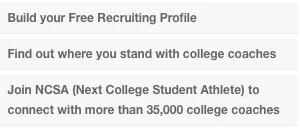Romero Case Enters a Bizarre Yet Understandable State
For the past few weeks, the battle between Leticia Romero and Kansas State over her permission-to-contact other schools had been getting increasingly tense. Public support was lining up behind Romero, who also retained an attorney. But now tense has become bizarre:
[Kansas State athletic director John] Currie also said that he spoke with new Kansas State coach Jeff Mittie, and that Mittie believed it would be in the best interests of the program if Romero was allowed to transfer.
“Although it is unprecedented,” Currie wrote, “I believe that it is in this student-athlete’s best interest for the committee to reconvene to consider this new information and potentially approve her request for a conditional transfer release.”
Kansas state officials have declined to comment on the case, citing student privacy laws. But in a statement late Wednesday, vice president Jeffrey Morris maintained the appeals committee’s ruling is “final and binding, and there is no university procedure to re-examine one of those decisions.
How did we get to a place where the athletic director and head coach are fine with granting permission to contact other schools, but the university is refusing? The answer is in the interplay between the NCAA’s requirements for this process and the specific facts of the Kansas State/Romero dispute.
Kansas State denied the request because of tampering concerns, but not the standard concerns of coaches at other institutions contact the athlete before permission was granted. KSU believed or feared that the outgoing coaching staff was shopping Romero to other schools in an effort to land new jobs. Ignoring other questions about how the NCAA should view that, Kansas State had no easy way to respond to a permission to contact request. Without knowing where the coaching staff was headed, Kansas State did not know which schools they needed to deny permission to contact.
Kansas State also did not have the luxury of waiting. NCAA rules require that an institution respond to an athlete’s request for permission to contact other schools within seven business days. If the institution does not deny the request within that period, it is automatically granted. Similarly with an appeal, if the institution does not complete the appeal process and render a decision within 15 business days of receiving the athlete’s request for an appeal, the athlete automatically wins the appeal and permission is granted.
There is plenty of room to debate whether Kansas State should have done or should be allowed to do what they did. But the motivations are easy to understand. The problem is that NCAA requirements pushed the process forward to completion, after which the major issue resolved itself. Had Kansas State been able to delay the process, it likely would have ended up with more reasonable permission to contact restrictions. Generally a delay in these proceedings is bad for the athlete but in this case it might have led to a better result.
It is even easy to understand Kansas State’s rigid instance on not reopening the case. The school may fear that allowing reconsideration, a second appeal, or presidential intervention in this case will result in that becoming the norm in permission to contact disputes. There is no simple way for Kansas State to climb out of this hole. A more complicated approach is necessary.
Given the bad press and the fact that the issue which led to the denial in the first place is now able to be resolved, Kansas State president Kirk Shultz should direct permission to contact be granted. Even leaving restrictions like no conference schools, no schools on upcoming schedules, and no Northern Colorado (where the former coaches are now employed) would probably be considered a win-win at this point.
The more complicated part is that Kansas State should commit to reevaluating its permission to contact procedures. That should include looking at K-State’s blanket statement indicating granting of permission to contact is unlikely as well as creation of a mechanism by which at least the athletic department if not the athlete as well can request that an appeals decision be reconsidered or withdrawn. A more thorough review would include designing a second appeal opportunity or guidelines for presidential intervention.
Finally, Kansas State should turn over as much information and evidence as they have of the alleged shopping of Romero by the former coaching staff to the NCAA. It is highly unlikely that anything comes of it. But right now Kansas State appears to fighting a losing battle for nothing. Turning in the former coaches would at least show that Kansas State was serious about its reasoning for taking such a drastic action against an athlete.
Augustana College-Illinois Sports Recruiting.
Alfred University Sports Recruiting


